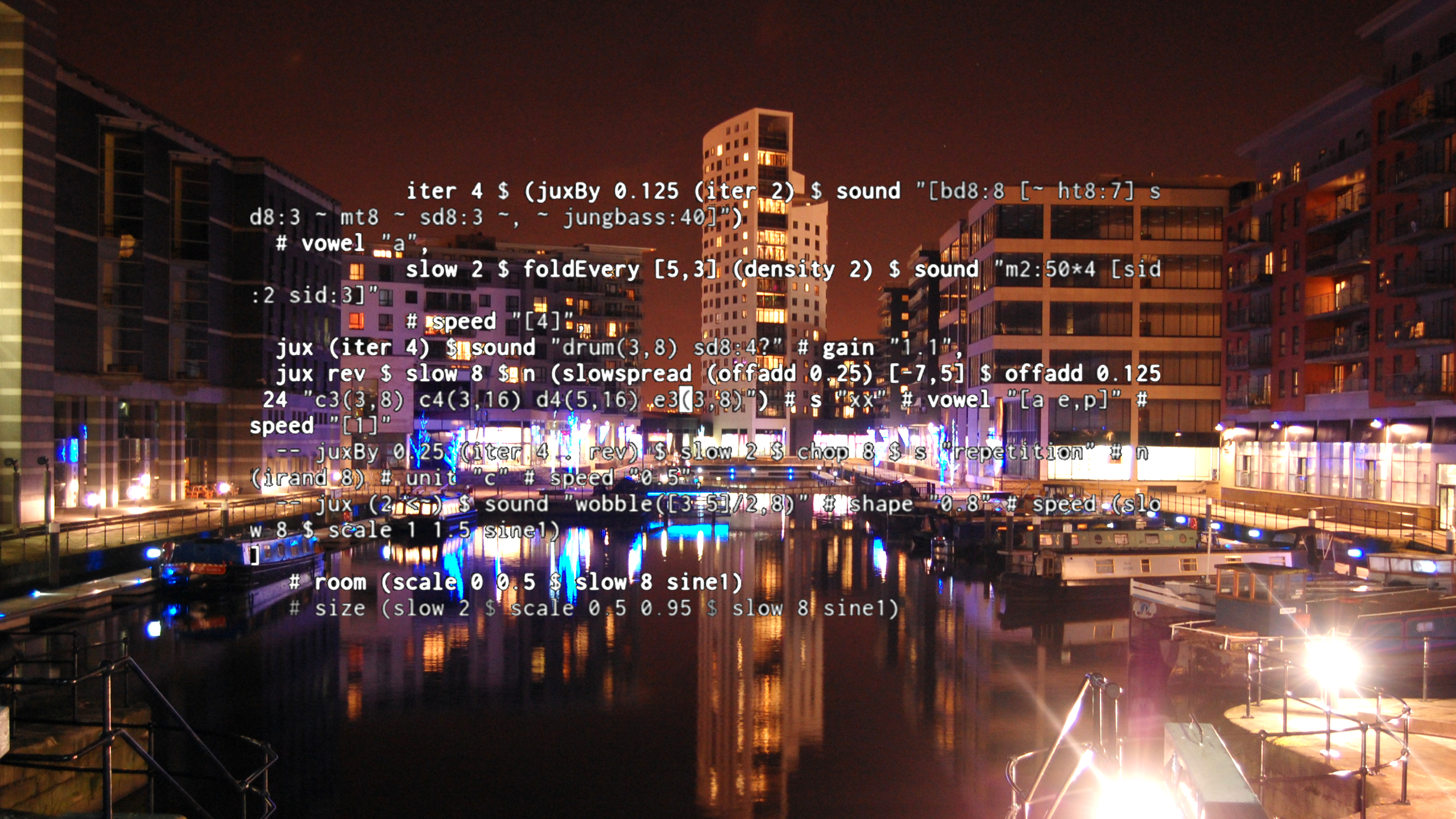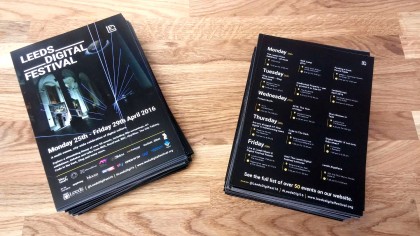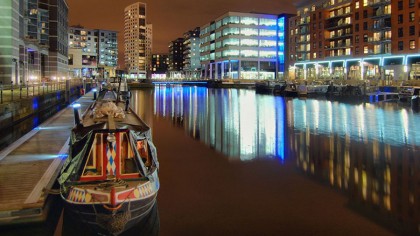Want to witness a live music rave using algorithms? Head to Leeds Digital Festival
Algorhythms at work

This article is part of TechRadar's Northern Powerhouse column, a series focusing on the development of the North of England's tech sector.
Leeds, England is home to what many people regard as one of the best metropolitan music festivals in the country. Called Live at Leeds, it attracts tens of thousands of music fans each year who pack out the 22 participating venues spread across the city.
This year, Live at Leeds is teaming up with Leeds Digital Festival to stage an event that combines global musical talent with companies from the city's tech scene. It's a clear hat-tip to the similarly crossover SXSW (or South by Southwest) festival, which is held under the beating Austin, Texas sun in March each year.
Weather aside, the two cities are surprisingly similar: Leeds spans 551km-squared (compared to Austin's 704km), and has a population of 715k (compared to Austin's 885k). Leeds Digital Festival promises to be equally as diverse as its inspiration, featuring everything from a kids' coding club to a gallery of artwork created by winners of the prestigious Lumen Prize - a celebration of digital art.
Spotify, Microsoft and Shazam are among the tech companies lined up to speak alongside media outlets including BBC, Sky News and the Yorkshire Post.
Back with a bang
After fading into the background in 2011, the festival is returning to a "different" Leeds in 2016 according to its director Stuart Clarke.
With more tech startups located in the city alongside established giants such as Sky, he argues that - while Yorkshire's largest city now has a more diverse digital culture than ever before - it needs to learn the art of self-promotion to make more people aware of it.
Sign up to the TechRadar Pro newsletter to get all the top news, opinion, features and guidance your business needs to succeed!
Techradar talks to Clarke about why it probably won't be asking Steve Wozniak to speak any time soon, how Leeds can fulfil its digital potential and what it means to stage an "Algorave".

Techradar: Leeds Digital Festival in 2016 is back after a few years out. What's changed?
Stuart Clarke: The peak of the last one was in 2011, and it's drifted off in the last few years. But Leeds is a different city now - I think it's more confident - certainly so in the digital industry as more startups and companies move into the area.
We've seen a lot more jobs created, Sky being a great example of that. They needed to build a whole new tech scene outside of London with a really good digital culture and chose Leeds over Manchester, Birmingham and Bristol, and they've been really successful. They have hired four hundred-odd people in less than a year.
Sky Bet are taking on people every week, and there's also HSCIC (creator of the NHS's digital health records) here. Leeds is a real success story and there's so much going on that people in the sector don't really know what's going on here, let alone the city.
TR: What kind of people are you aiming to attract to the festival?
SC: Absolutely everybody. We want to make it city-wide so that we get people crossing the city and collaborating rather than sitting in the conference hall for the day.
Fifty out of fifty-four of its events are free, and there's a variety of them on areas including data, digital health and FinTech. Then there's the cultural side of digital - so there's the Lumen Prize, the world's most prestigious digital art prize - and we're collaborating with Live at Leeds.
There's quite a bit on data too because we're a "big data" city - we've got more data scientists in Leeds than anywhere else outside of London.
TR: How much of an influence has SXSW been on the festival?
SC: Quite a bit actually. We have a number of people in Leeds who have been there and come back enthused, and we could see a link-up between music and digital. It just gives it a different edge to a pure business digital conference and helps make it interesting to people who think a digital programme isn't for them.
TR: How do Live at Leeds and Leeds Digital Festival overlap?
SC: There's a really good programme of events on Friday the twenty-ninth that overlaps Live at Leeds. That night we're having an Algorave, where we're staging a live music rave using algorithms. It involves people who write computer programs while on a stage, and those algorithms are then turned into music and lighting. Obviously there's lots of dancing too.
TR: Which of Leeds' venues are going to be involved?
SC: It's all spread out, so we've got places like Salem Chapel, Headrow House and Belgrave Music Hall which are fantastic venues. We're also holding events in offices belonging to KPMG, law firm DLA Piper and there are also things happening at the city's universities.
The support we've had from the city itself and the sector has been fantastic. Leeds City Council has provided a little bit of seed money to get things going, and we've had great support and sponsorship from Sky, Sky Bet, KPMG and Leeds Dock.
TR: Leeds Dock has been called central to the city's digital transformation. Why is that?
SC: The dock has suffered some bad press over the years - the previous owners tried to transform it into a retail destination but that never really caught on.
Allied London are trying to transform it into a workplace with a digital edge. They're turning what was the old casino into a co-working tech hub, so it will be interesting to see how that develops over the next year. Sky are based there, with the last lot of staff set to move there in May. Companies like Epiphany and Branded3 are there so it already has a good sector.
Leeds Dock has been really supportive of our festival - there are a number of events taking place there. On the Monday night we kick off with The City Talking: Tech In Leeds documentary premiere, and it continues into the Saturday with the Lumen Prize and a code club for kids, so there's something for everybody.

TR: How has the government's TechNorth agency been involved with the festival?
SC: TechNorth has given us some sponsorship so they've been very supporting, but we don't have any events planned with them at the moment. I'm sure next year we'll be doing lots with them.
TR: Do you see the festival eventually attracting people like Steve Wozniak, who is speaking in Manchester this week, or is it more concerned with local voices?
SC: Most of the organisations and speakers this time around are local, and I think that's really key. We don't want to be importing overseas superstars. Not least because they don't know the culture of the city and where we're strong, but it's also really expensive.
Steve Wozniak's asking price is around sixty-thousand dollars - and you have to charge a lot of money for people to see that. Most of our events are free which is really important, and it means we can attract everybody from startups to students.
TR: Why is digital one of Leeds' best kept secrets?
SC: Leeds has been called the "Knightsbridge of the North" for its shopping, and we have the Trinity Centre that opened a couple of years ago with Victoria Gate opening later this year.
There are physical signs you can see of some of the industries around Leeds, like any city. The digital side is behind closed doors to a certain extent, but there's so much innovation going on.
The NHS' digital patient records were created by a local Leeds company. For years the NHS has been trying to build them for literally billions of pounds. It handed the project over to HSCIC (Health and Social Care Information Centre) in Leeds, who built it in record time on budget and at a lower cost of millions.
It's done using open source and flexible technology; it's a great innovation that we don't tell the people around the city about enough. Nor do we tell them that in the Leeds region there are 70,000 jobs in the digital sector with nearly 10,000 companies which is growing year-on-year.
TR: It seems that Manchester shouts a little louder about its tech achievements than Leeds...
SC: It does, and there are some fantastic companies over in Manchester. I always say that Manchester companies can open a crisp packet and send out a press release - they've got that real confidence about their city and that's where we need to be in Leeds.
We do fantastic things and feel that we shouldn't be shouting about them, but it's about time we did.
TR: Leeds is known for having the largest legal and financial sector outside of London. How will that help the city's digital sector grow?
SC: We have a growing FinTech sector which is the biggest outside of London's, and we're making the most of the links within the financial sector that Leeds already has.
It's been an innovative city for hundreds of years, first in manufacturing and then retail and direct marketing. Going back many years ago, FreeServe came out of the city and was the first free internet service, so it's really about continuing that strong track record of innovation.
- Leeds Digital Festival takes place on April 25 - 30
- Live at Leeds takes place on April 29 - 30
